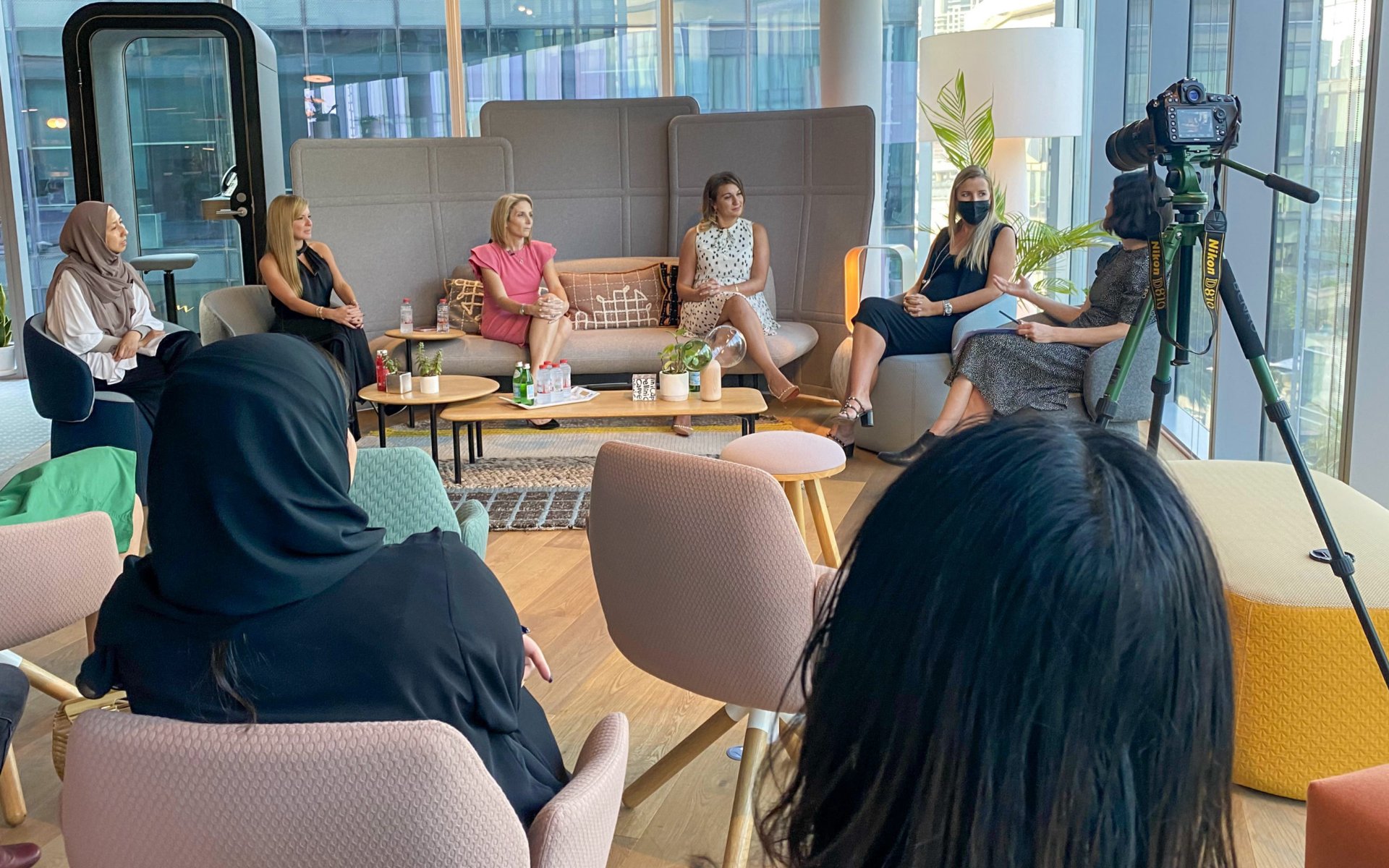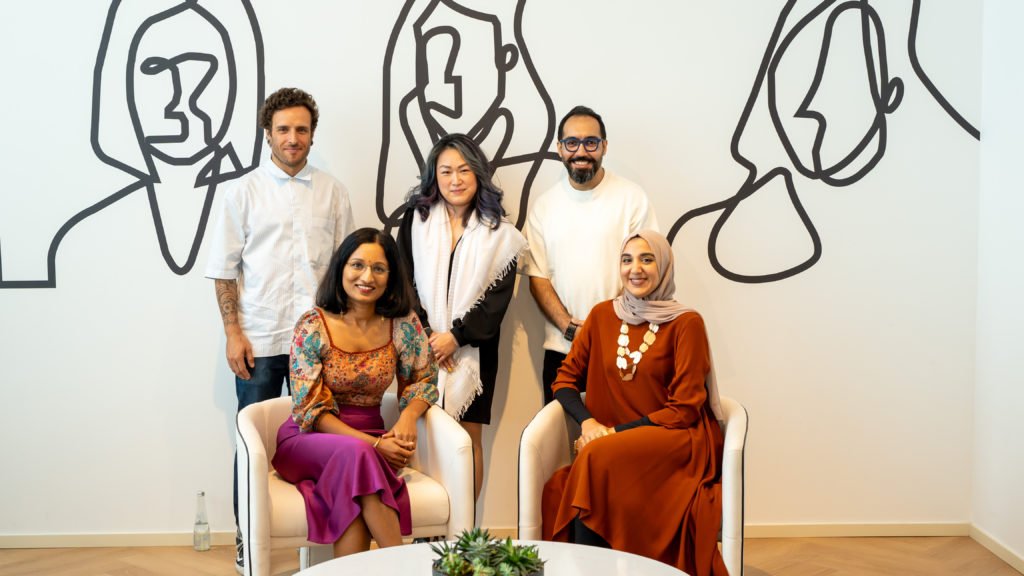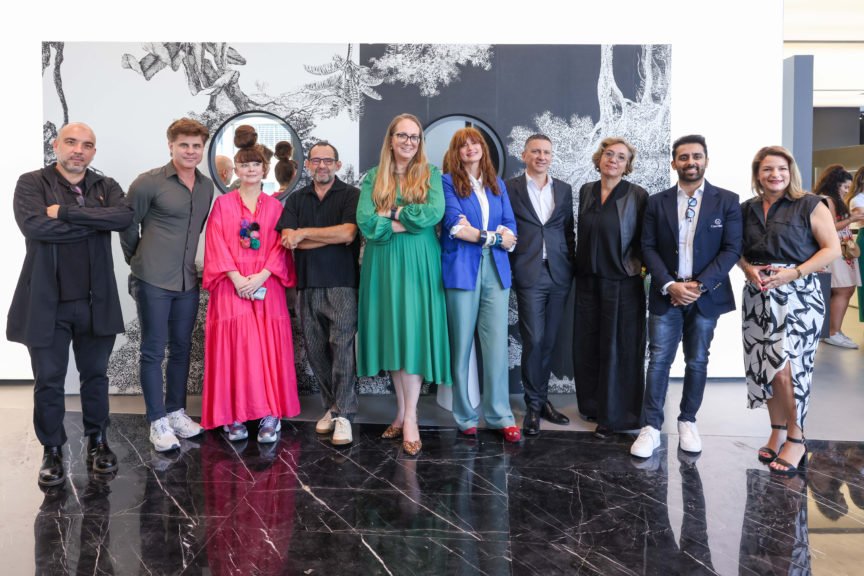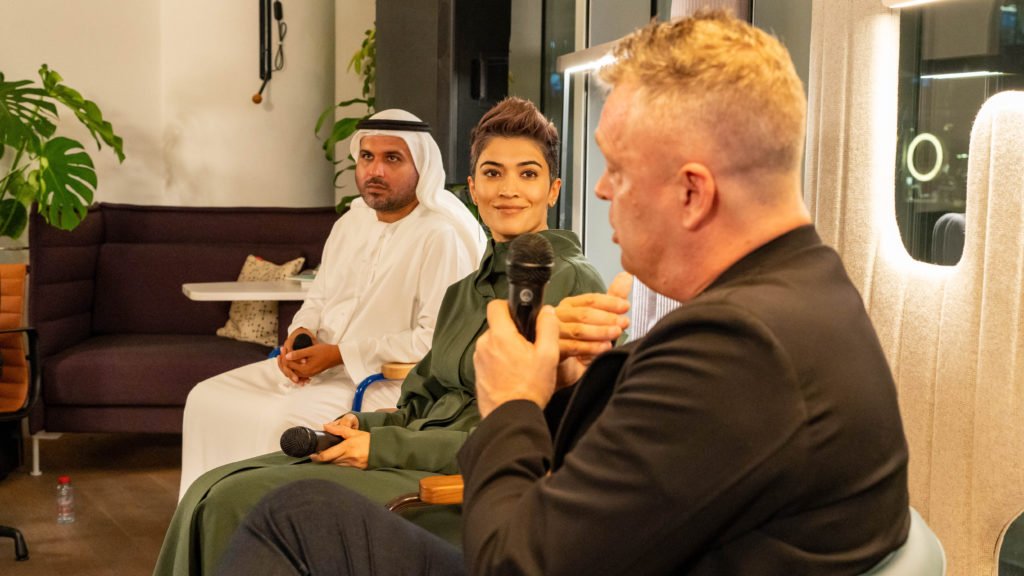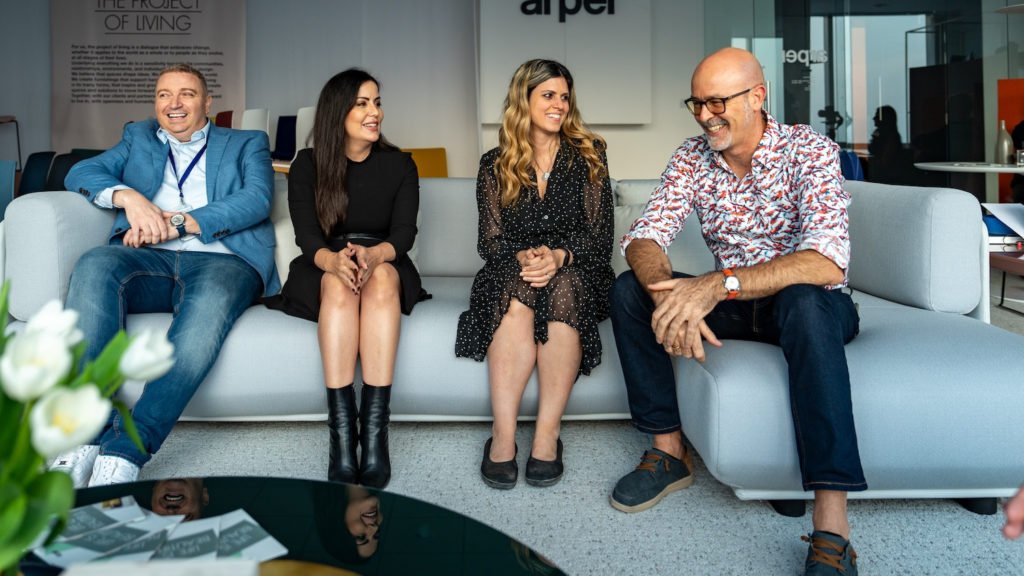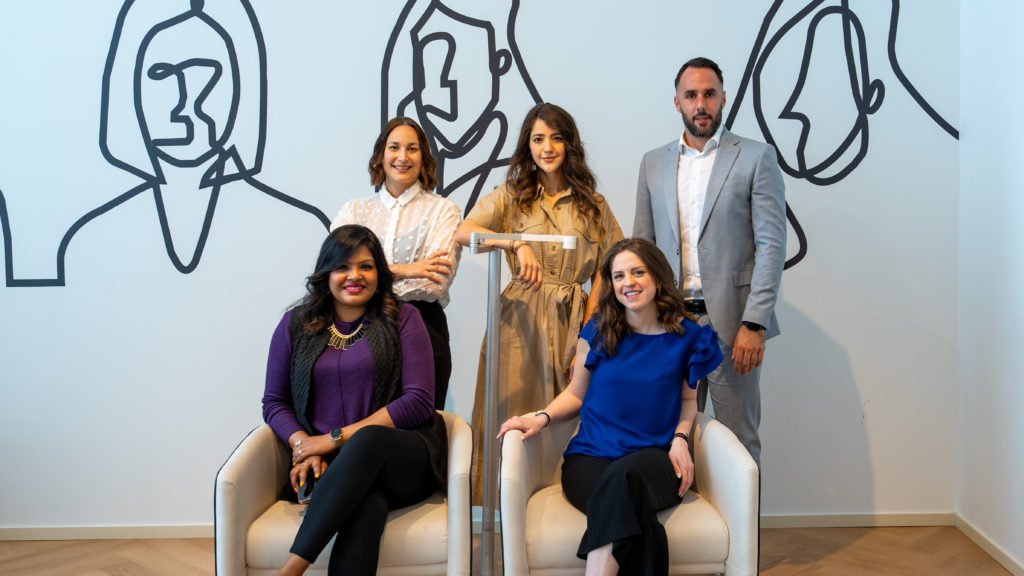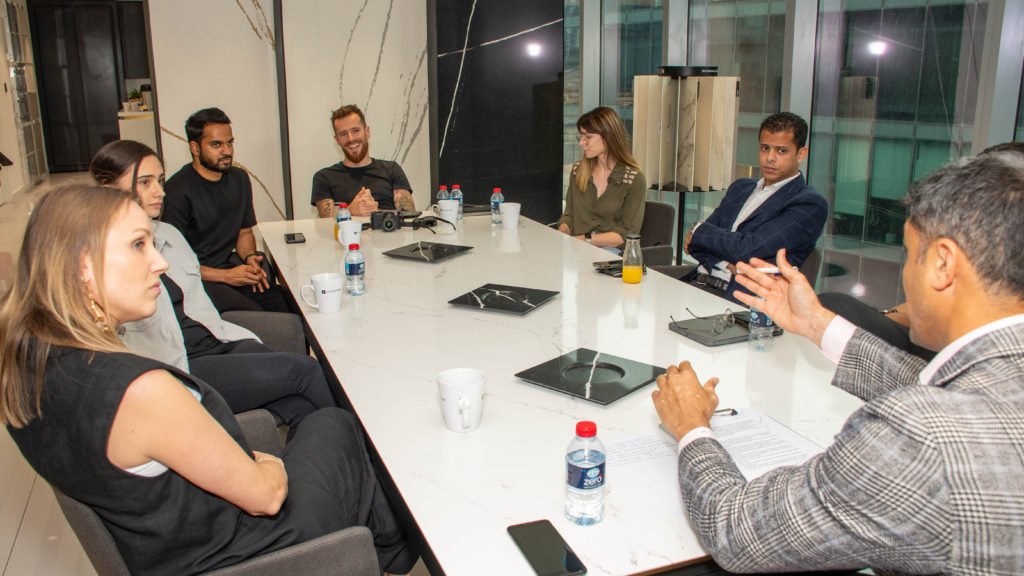According to several reports detailing the impact of women in the corporate workspace, including but not limited to McKinsey’s latest Women in the Workplace report, women have proven themselves, time and again, to be exceptional leaders in tough situations, ranging from pandemics and economic crises to foreign policy. Bringing our focus to the Middle East region, specifically within the interior design and real estate industries, you will find exceptional women who have made a significant impact in their respective roles.
In this panel discussion, hosted by Haworth, we speak with an all-women panel representing the best of UAE’s interior design, architecture, and real estate industry. We chat about the impact of their presence in the workspace, and how they are shaping the future of work.
THE EXPERTS
From left to right: Nicola Trivett, Commercial Director at Summertown Interiors; Mariam Halim Kamel, Operations Manager at Al Tayer Stocks; Rozanna, Senior Architect & Designer at Schlumberger; Yullianna Porter, Head of Workplace & Design at JLL; Natasha Ackermann, EMEA Portfolio Manager at Shell
The impact of women in the corporate world
A recent study claims that by 2030, the share of women in both white and blue collar jobs is set to more than double. While the stat represents a worldwide count, there will no doubt be an evident change in the Middle East region as well. “We’re now seeing a greater focus on women and diversity in the workplace,” says Jennifer Celesia, Senior Workplace Advisor at Haworth and moderator of the talk. “The ongoing discussion isn’t just about the future of work, but the workplace as well.”
“Firstly, we need to understand what change is or should look like,” says Mariam Halim Kamel, Operations Manager at Al Tayer Stocks. “A lot depends on the type of company and the work you do. In our case as contractors, we’re on site a lot and involved in operations. For the longest time, and even till today, it’s a struggle to find a women’s only washroom. It’s not surprising because contracting, field work, and project management in our industry is dominated by men. So there’s no attention paid to details like this. But we are starting to see change, even though it’s slow.”
“If you look at most of the successful women in our industry, you will find that they love their job. If you want to pursue a career in this industry, you should be passionate about it.”
– Mariam Halim Kamel, Operations Manager, Al Tayer Stocks
“Diversity is incredibly important to an organisation, and I firmly believe that companies should pay attention to Diversity and Inclusion (D&I) in the workplace,” adds Yullianna Porter, Head of Workplace & Design at JLL. “Diversity is important in teams because it brings in new perspectives, creativity, and innovation. When you have minorities or underrepresented communities, you are able to see gaps in the system or the policies.”
Yullianna explains that diversity is also about making sure everyone has an equal amount of representation and voice at the table. “Being able to be heard is imperative. I’ve been here for 11 years, and I’ve had great male mentors and role models, and I’ve always felt heard. I know it’s made a difference. I’ve also seen leadership teams move to a greater proportion of females, and you can see that the culture in the company has changed for the better. The overall EQ of the team grows tremendously.”
Is the new hybrid style of working, actually working?
On the theme of support and mentorship, Rozanna, Senior Architect & Designer at Schlumberger, shares her experience on how mentorship plays a role in bringing about change, and how it has contributed to her success. “I was lucky to have good mentors, both male and female. The fact that my mentors, especially my male bosses, were so supportive, encouraged me to speak up and move forward. Getting ahead in your career is about putting in the hard work and putting yourself out there. It helps tremendously when people create an environment for you to do so.”
“Diversity is important in teams because it brings in new perspectives, creativity, and innovation.”
– Yullianna Porter, Head of Workplace & Design, JLL
Diversity, inclusion, and the rules for success
Diversity matters. It isn’t limited to just increasing and promoting women in the workplace, but extends to all other underrepresented communities. However, we have to start somewhere. And as we’ve seen, women are taking the charge.
There’s a clear case for women in the workspace, and the positive change that comes with it. Natasha Ackermann, EMEA Portfolio Manager at Shell, explains how companies are stepping up. “In the last five years, Shell has taken several strong initiatives to increase the number of women in our organisation. The dedication to diversity and inclusion is a big part of Shell’s strategy to become the most diverse company in the world. Our approach to hiring, training, and promoting has changed, and we want to encourage this diversity and inclusion”.
“As women, what are the unwritten rules for success,” asks Jennifer. It’s an important question, given how there’s no clear playbook for women in the workplace.
“Never see yourself as different or less than anyone else. Be confident in your ability to take on any challenge. Have a strong work ethic, integrity, and be respectful. That’ll take you far in your career.”
– Nicola Trivett, Commercial Director, Summertown Interiors
“For me, it’s simple. Never see yourself as different or less than anyone else,” Nicola Trivett, Commercial Director at Summertown Interiors. “Be confident in your ability to take on any challenge. Of course there are limitations, but trust yourself. Coming from a contracting background, there are several challenges to this. It’s not exactly the work environment that most women envision. It’s far harder than it looks. Have a strong work ethic, integrity, and be respectful. That’ll take you far in your career.”
However, it has to be said that sometimes women have to work harder than their counterparts to achieve similar success, as Yullianna points out. “You have to be willing to put yourself out there. Nothing comes easy and nothing comes free. You have to be willing to make sacrifices and get out of your comfort zone. Remember, if you’re not uncomfortable, it means you’re not learning and growing.”
How can we help the next generation of female leaders?
It’s a known fact that in several workplaces, women are taken for granted and their opinions ignored. “Women are often told to grow a thick skin. And when we complain, in some cases it isn’t taken seriously, what do you say to that?” asks Jennifer.
“Assertiveness is an important trait that shouldn’t be ignored,” says Rozanna. “Yes, women are often taken for granted in the workplace, but you should know your forte and put your foot down when you believe in something and want for something. I’ve declined important projects or scopes of work before because I knew it wouldn’t work out. I’m a trained architect, and I know what a space is capable of. It’s important to draw the line, and also learn to say no.”
So what does the future hold for women in the industry?
An overwhelming number of reports point to the benefits of having more women in the workforce. Not simply by just increasing the number of women, but having more female leaders and key decision makers.
Jennifer wonders what the workspace will look like a year from now. Will those who have chosen to primarily work from home continue to do so. Will people burn out, or will they think, ‘Oh, actually, this works beautifully’? “I appreciate the mindset of being flexible, and to allow for that autonomy is really important,” she says. “In terms of this next generation, what can we as an industry do better? How can we help that next generation of female leaders? What’s missing?”
“Assertiveness is an important trait that shouldn’t be ignored. You should know your forte, and put your foot down when you believe in something and want for something.”
– Rozanna, Senior Architect & Designer, Schlumberger,
“Mentorship,” says Yullianna. “To be very honest, I think we’re still competitive as females, and sometimes we put each other down. We create obstacles and hurdles. Just help everyone around you and give greater visibility to what you’re doing. Show where you’re failing, show your weaknesses, and empower everyone around you to do what you’ve done wrong, or what you haven’t done correctly. This will help them to do better. Try to be as transparent as possible. If I look back at my career, I think strong mentorship would have helped me do better. So that, to me, that’s very important.”
“Education is huge, and it needs to start at the grassroots level,” adds Nicola. “I’ve got three daughters, and if it wasn’t for my occupation, they would have no idea what a civil engineer does. We need to educate them at a much younger age. And girls need to be aware of all the careers that are available throughout the whole spectrum of design and construction. There’s a world of opportunity out there beyond design, and they need to understand that these opportunities are there. That will only become apparent when there are more panels like this where we’re putting ourselves out there. And you’ve got social media now, which is a better way to connect with them. But for me, it needs to go a further step back. We need to fight for the next generation that’s coming in. We need to support them and be their voice.”
“And if you look at most of the successful women in our industry, you will find that they love their job,” says Mariam. “So I think it’s very important to include as part of their education that if they want to pursue a career in this industry, they should be passionate about it. This industry isn’t easy. All of us here enjoy what we do, and that is imperative if you want to be successful. I think the earlier they realise this, the better.”
